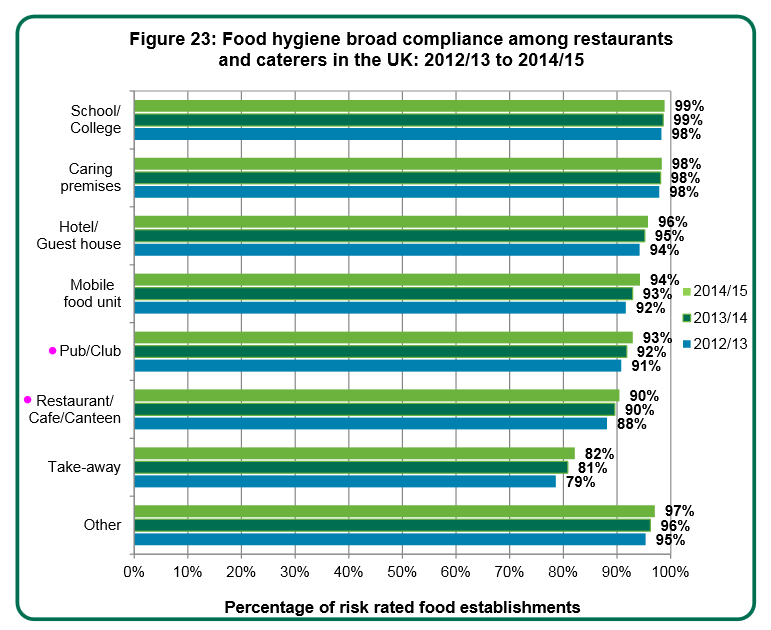The report, which was published earlier this week (11 November), compiled data from local authorities about food law enforcement activity across the country.
Data gathered by local authorities showed pubs had increased their hygiene ratings on average by 1% to 96% for the 12 months between 1 April 2014 and 31 March 2015, compared with the same period in the previous 12 months.
However, restaurants, cafés and canteens didn’t increase their average hygiene rating from 90% when compared with the same period last year, the report showed.

Steve Osborn, principal consultant for food and beverage at the Aurora Ceres Partnership, said: “Over the past few decades, the increase in ‘eating out’ has resulted in change.
“Pubs have become family-centred dining experiences, rather than watering holes, and with that comes a different and higher expectation from consumers. The pub sector has also come under competition from other food service sectors that have adopted much stronger corporate attitudes to food safety.”
Pubs and restaurants also outperformed the food sector as a whole, which had an average hygiene rating of 93%.
‘The need for a good rating’
Dr Lisa Ackerley, a food safety advisor to the British Hospitality Association and a strategy advisor to Cuticura, said: “The improvement in standards in pubs is probably associated with the need for pubs to get a good food hygiene rating from the FSA.
“I think the scheme, which ranks food establishments on a one to five basis and is mandatory in Wales, but not England, has been very successful in driving up food hygiene standards in the sector.”
A rise in social media activity among diners also had a part to play in the increasing standards, she added.
FSA rating scheme
I think the scheme, which ranks food establishments on a one to five basis and is mandatory in Wales, but not England, has been very successful in driving up food hygiene standards in the sector
- Dr Lisa Ackerley
Steve Livens, product assurance and supply chain manager at the British Beer and Pub Association, said: “Overall, the FSA report paints a very positive picture of standards of hygiene in pubs, which are very high and rising.”
Despite the positive results, commentators urged for more action to be taken by pub chefs on issues like cross-contamination in kitchens, such as meat and poultry cross-contamination, and getting up to scratch on allergen labelling.
Teresa Dupay, founder of the company Menu Analyser, claimed the majority of pubs didn’t have adequate allergen labelling in place for their diners, which put them at risk of fines, prison sentences and potentially losing their businesses.
“It’s very simple to get it right, though. Pubs can make their menus simpler and make sure that their food suppliers have all of the allergen information on their products before they come into the kitchen,” she explained.
‘Going through each dish’
“Then it’s just a case of going through each ingredient for each dish and listing the allergens and putting that into a folder for the staff to use when customers ask.
“But I’ve been into a lot of pubs and asked about allergen labelling and have been looked at like I was from Mars.”
Osborn urged pubs and the rest of the foodservice sector to now give focus to nutrition and making food healthier.
“The bigger concern in nutrition is that the foodservice and pub sector are lagging behind the food industry at large in terms of their commitments and results to salt reduction in particular, and expectations in the responsibility deal.”
Meanwhile, the FSA’s food hygiene rating scheme should play a bigger role in the foodservice sector, urged Osborn and Ackerley. However, they disagreed on the need to make it mandatory.
“I think it should be made mandatory because businesses will then have to up their standards even more,” Ackerley said.
However, Osborn added: “It should not be mandatory, but it should be the accepted ‘norm’ and if a site does not have its scores on the door, then a consumer has a right to wonder why.”
